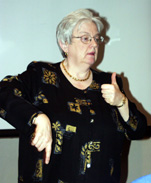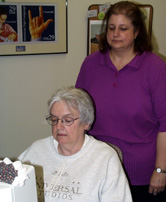 The delivery of health services for the Deaf is a sign of how other hearing disabilities will be treated, says Janet Killam, Region 2 field representative for the Nebraska Commission for the Deaf and Hard of Hearing (NCDHH).
The delivery of health services for the Deaf is a sign of how other hearing disabilities will be treated, says Janet Killam, Region 2 field representative for the Nebraska Commission for the Deaf and Hard of Hearing (NCDHH).
As interpreter requests increase it’s important that health professionals also understand the issues involving the Deaf and Hard of Hearing communities, said Killam, who shared her comments earlier this month in a forum sponsored by the NHS/UNMC Employee Diversity Network. April is National Deaf Awareness Month.
“Deafness is still a hidden and invisible disability in America,” Killam said. “Many people think I am just hard of hearing, but I am Deaf. The aging of America’s population is increasing the number of people who are hard of hearing and may lose all hearing ability. The treatment of the Deaf is really the barometer of how all issues involving hearing disability will be handled.”
Killam was born deaf, but her parents did not find out she was deaf until she was 2. She started auditory, lip reading and speech training at 21/2, but like any child, had no cultural sense of being Deaf. She grew up being able to hear and recognize familiar words with the help of a hearing aid. She can hear a phone ring, for example.
 But growing up in the hearing world and in Deaf culture are two different experiences. With hearing friends, Killam grew up afraid to speak because her friends couldn’t understand her speech. During her college years, she learned sign language and the world opened up to her.
But growing up in the hearing world and in Deaf culture are two different experiences. With hearing friends, Killam grew up afraid to speak because her friends couldn’t understand her speech. During her college years, she learned sign language and the world opened up to her.
“Sign language gave me much more fun and many more friends,” Killam said. “Signing gave me facial expressions, feelings and body language. I finally felt people understood not only what I was saying but my emotions, too.”
Killam got a laugh when she told the audience how she sat through conversations with hearing people and all she could do was nod her head. Hearing people, she said, also sit through boring conversations or conversations they can’t understand and nod their heads.
After spending 21 years as a teacher at a residential school for the Deaf, she has seen a new generation of deaf children grow up strong and self-assured in their abilities and culture. And, she said, deaf teenagers are as hip and creative as hearing teenagers.
“Just as many hearing parents will exclaim, ‘I can’t understand a word these kids are saying today,’ deaf adults also experience deaf teenagers using their own group signs,” Killam said. “Although the signs are universal, deaf kids will put some unique spins on certain signs as a form of slang. They don’t like us old folks catching on so many times my students will fold their hands together in my presence or turn their backs to me so I can’t follow their hands.”
Seeking medical care can be a daunting experience for the deaf and hard of hearing, Killam said. A deaf patient in a hospital room may be frustrated by comings and going of health professionals who cannot explain what is happening, or who talk to each other as though the patient isn’t in the room. Killam spends time with the NCDHH in case management and advocacy for the deaf and hard of hearing and conducts awareness workshops, presentations and sign language classes.
Judy Gouldsmith, NCDHH interpreter/program assistant, is a full-time interpreter who also spends time encouraging health agencies to maintain 24-hour access to professional interpreter services. There are only a limited number of certified interpreters available for the entire city of Omaha. When NHS Clarkson or University staff request an interpreter they may get one within one hour, five hours or not at all, depending on the demand for interpreters at any given time.
“A fully professional interpreter with American Sign Language isn’t considered really good until he or she has at least five years experience,” Gouldsmith said. “Interpreters for the Deaf have powerful relationships with their clients. They rely upon our knowledge of the medical terminology, our maintenance of strict confidentiality, our understanding of their culture and our availability.”
Contracting for sign language interpreter services is serious business. Interpreters in private practice in the Omaha and Lincoln area charge approximately $35 per hour with a two-hour minimum charge per patient visit. From July 2000 to June 2001, monthly NHS interpreter requests went from 28 to 58. Since July 2001, monthly requests have been from 38 to as many as 80 in October.
Requests for sign language interpreter services for patient-related issues should be directed to Flower Juarez at 559-2010. For more information about NCDHH, contact Killam or Gouldsmith at 595-3991.
Photos in descending order: 1) Janet Killam; 2) Janet Killam and Judy Gouldsmith.